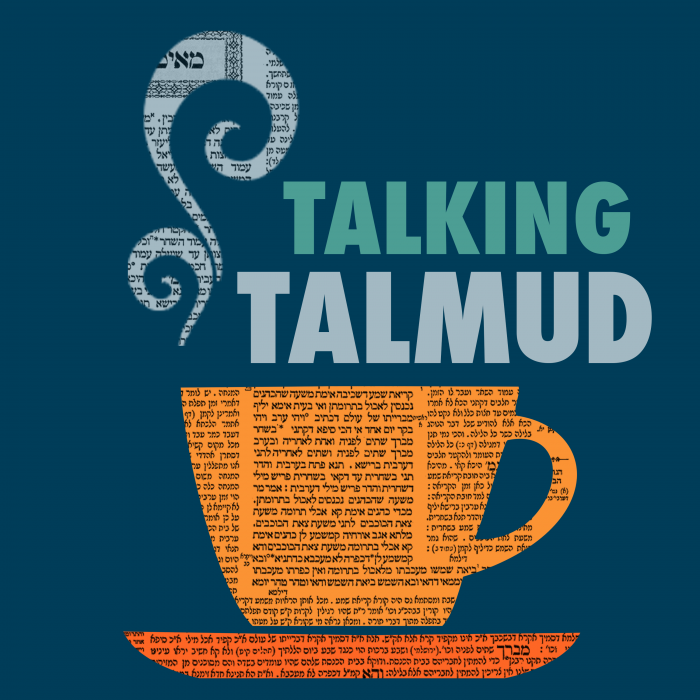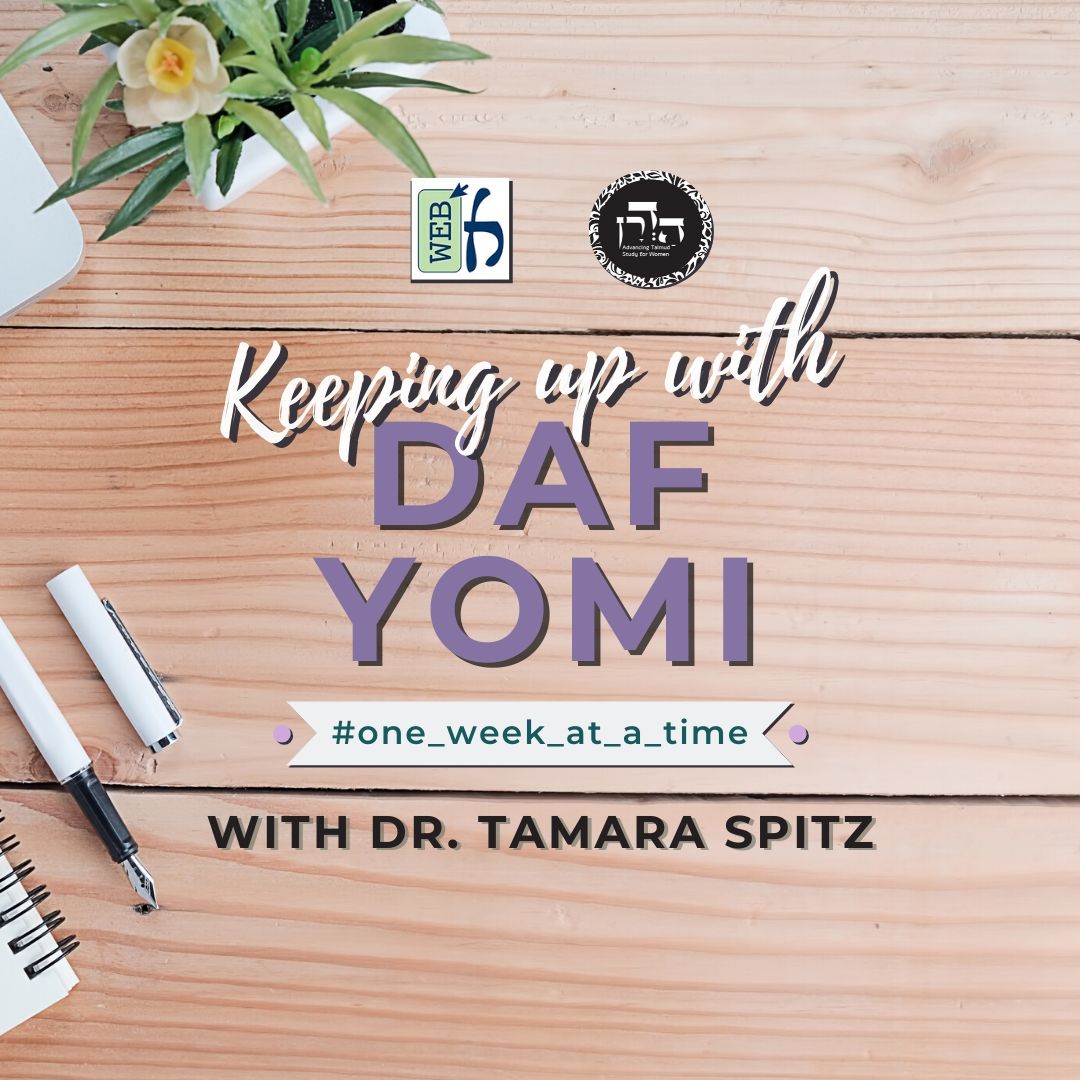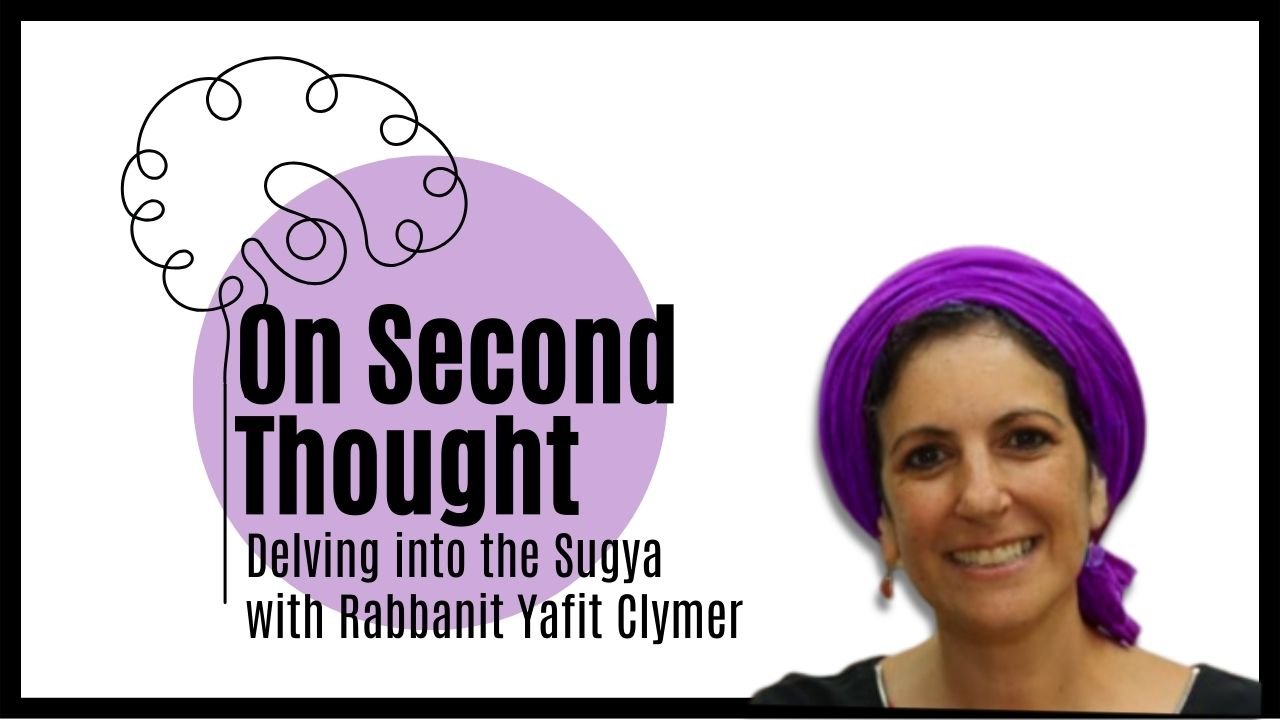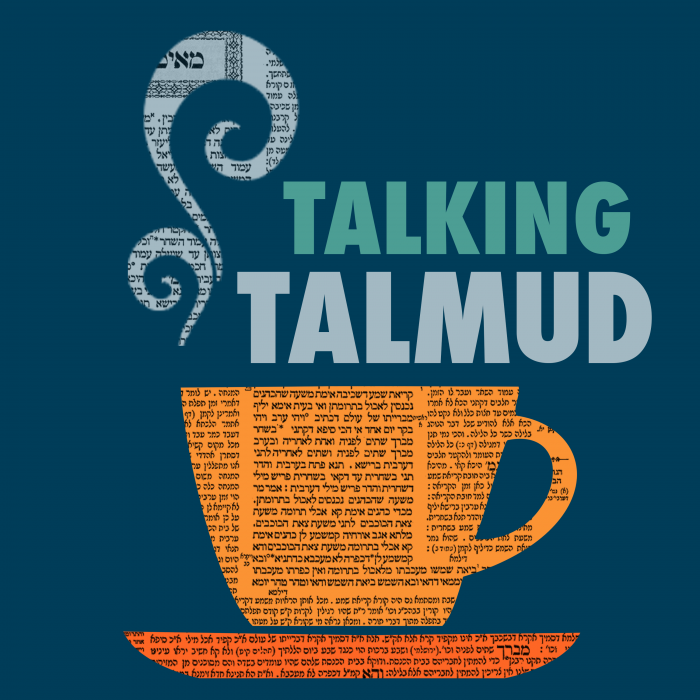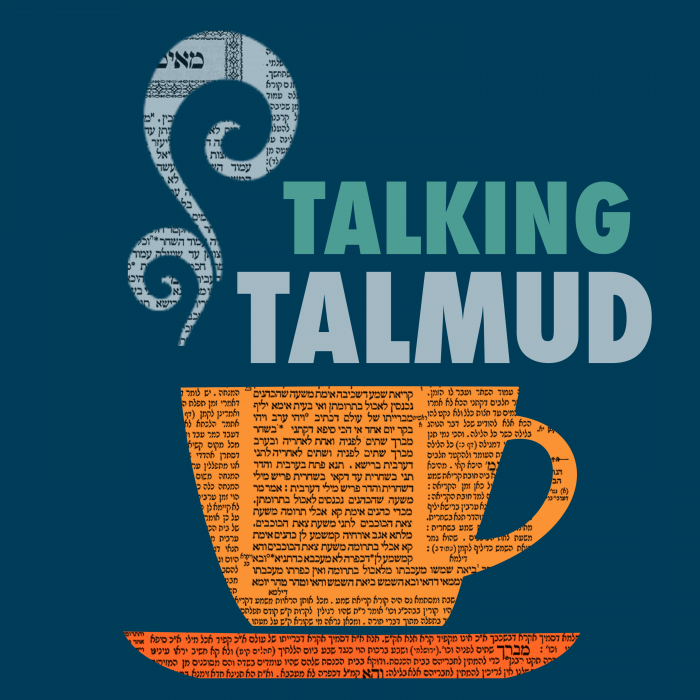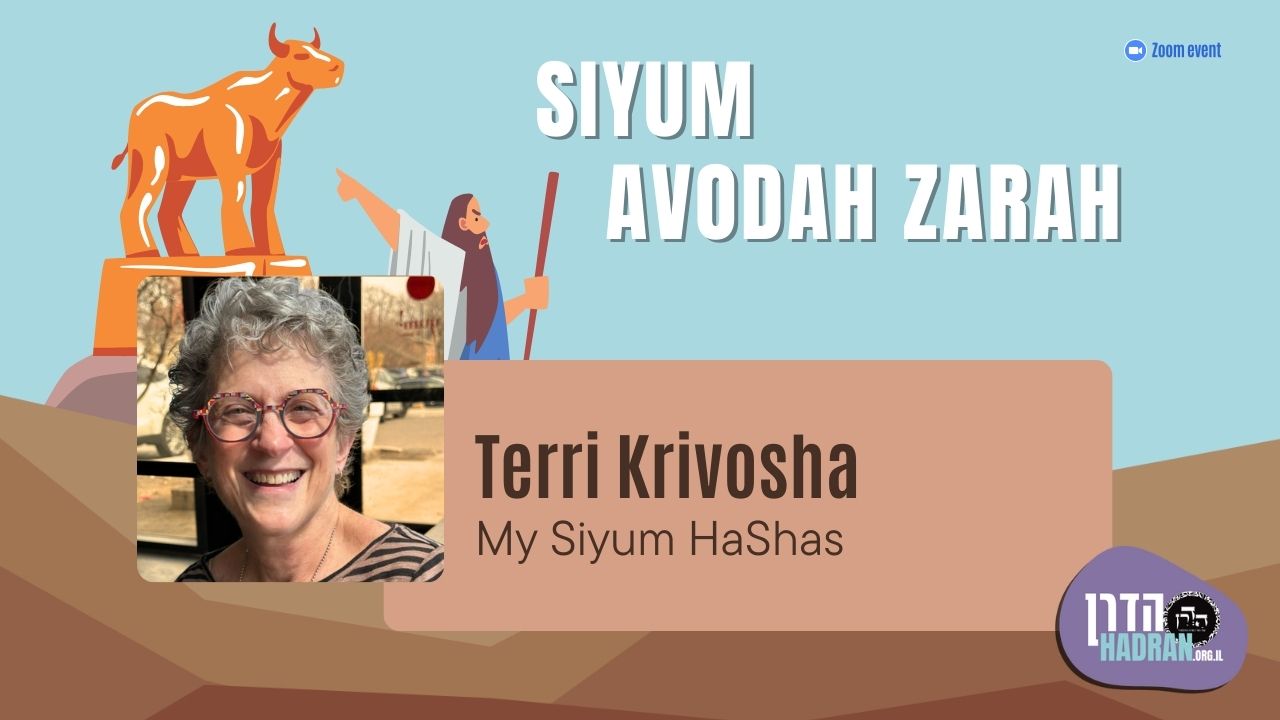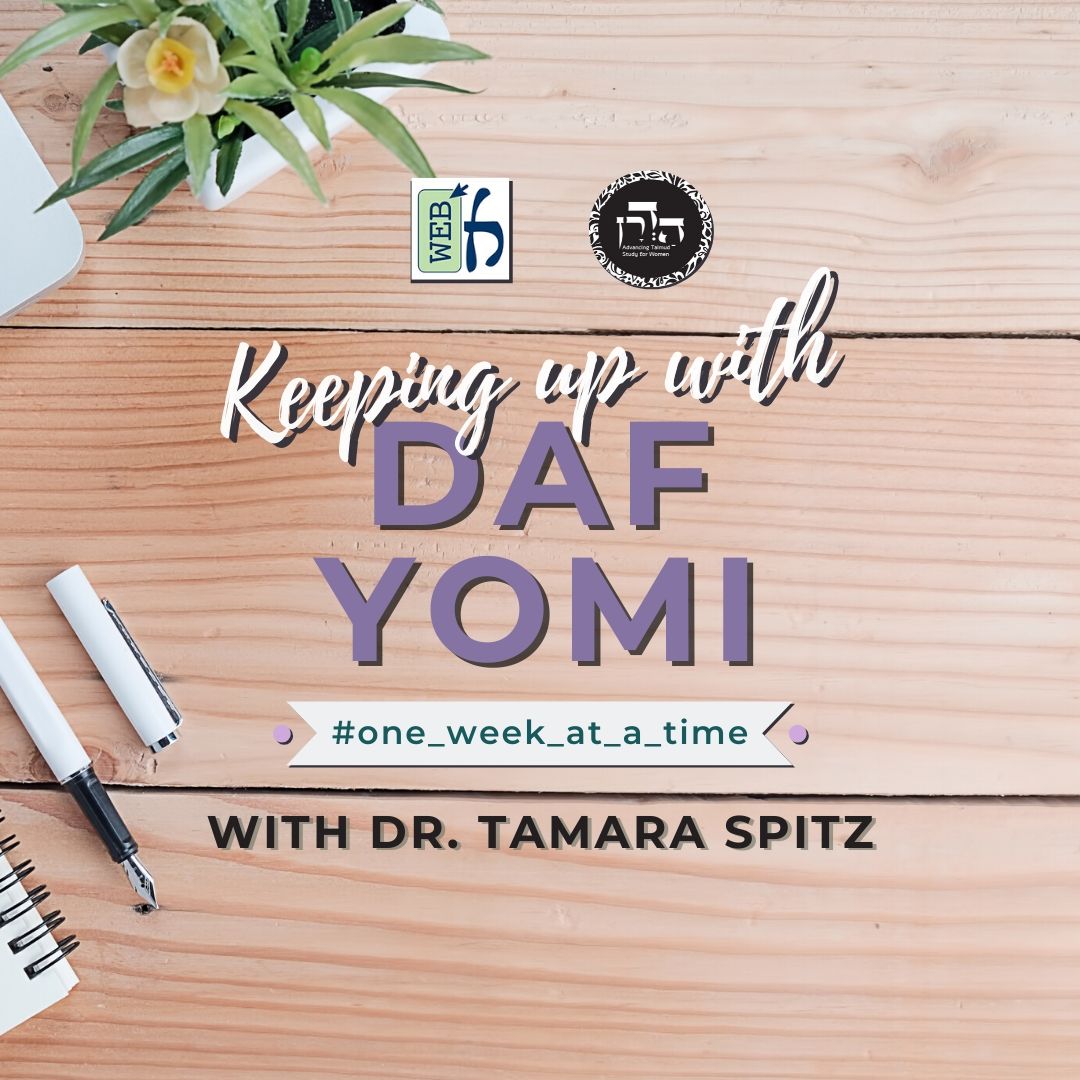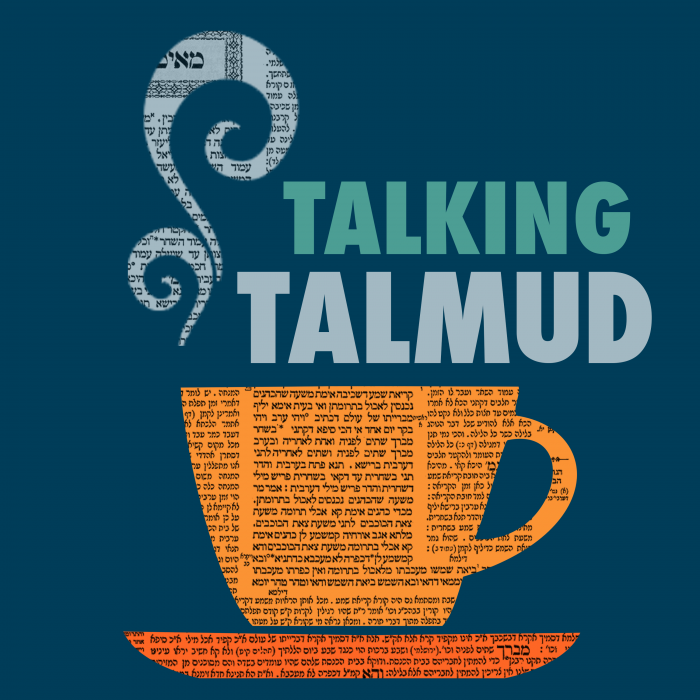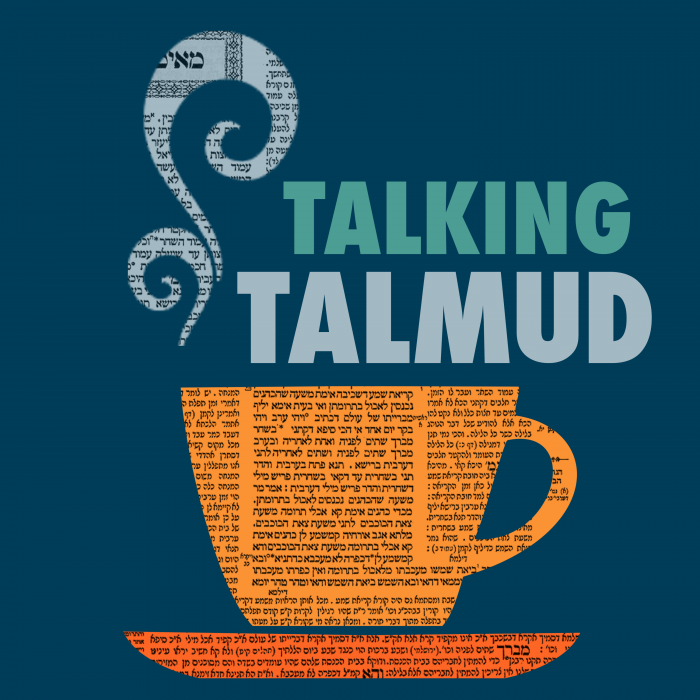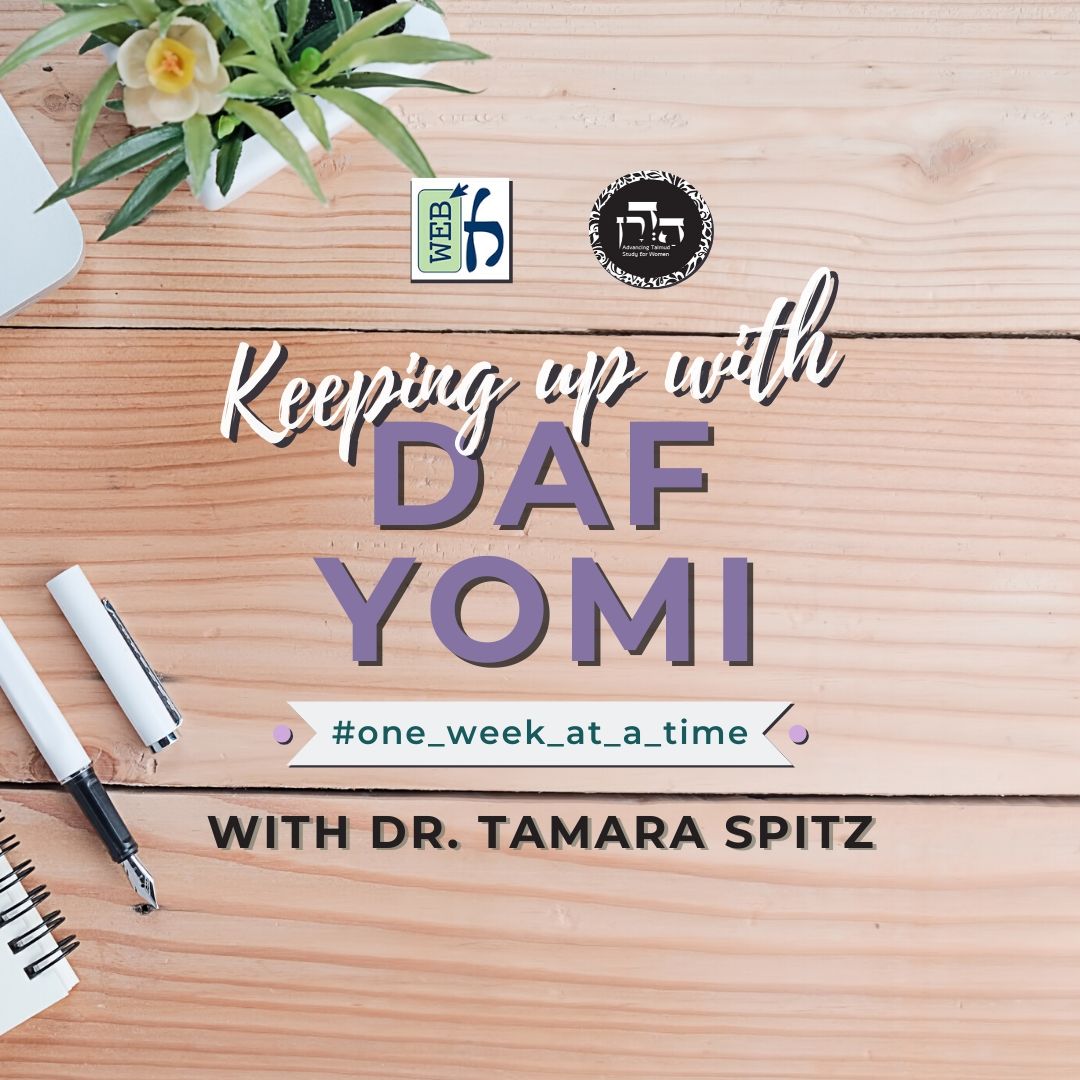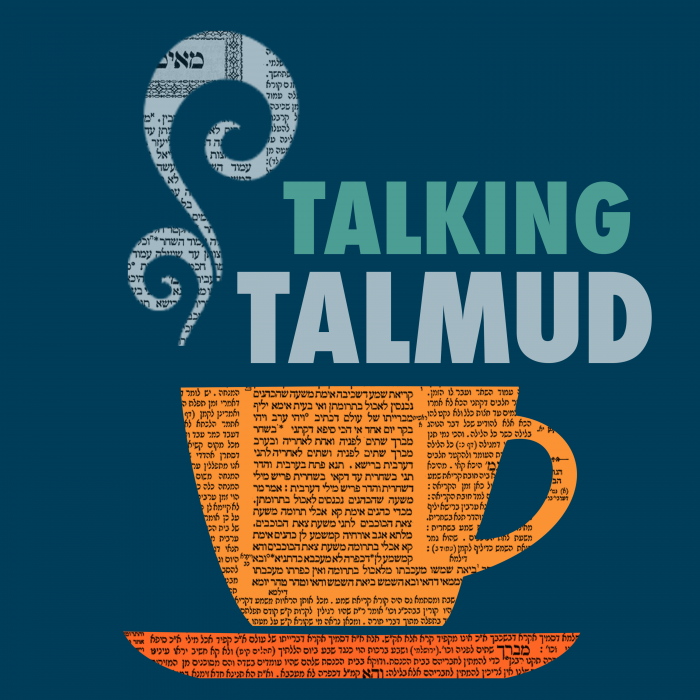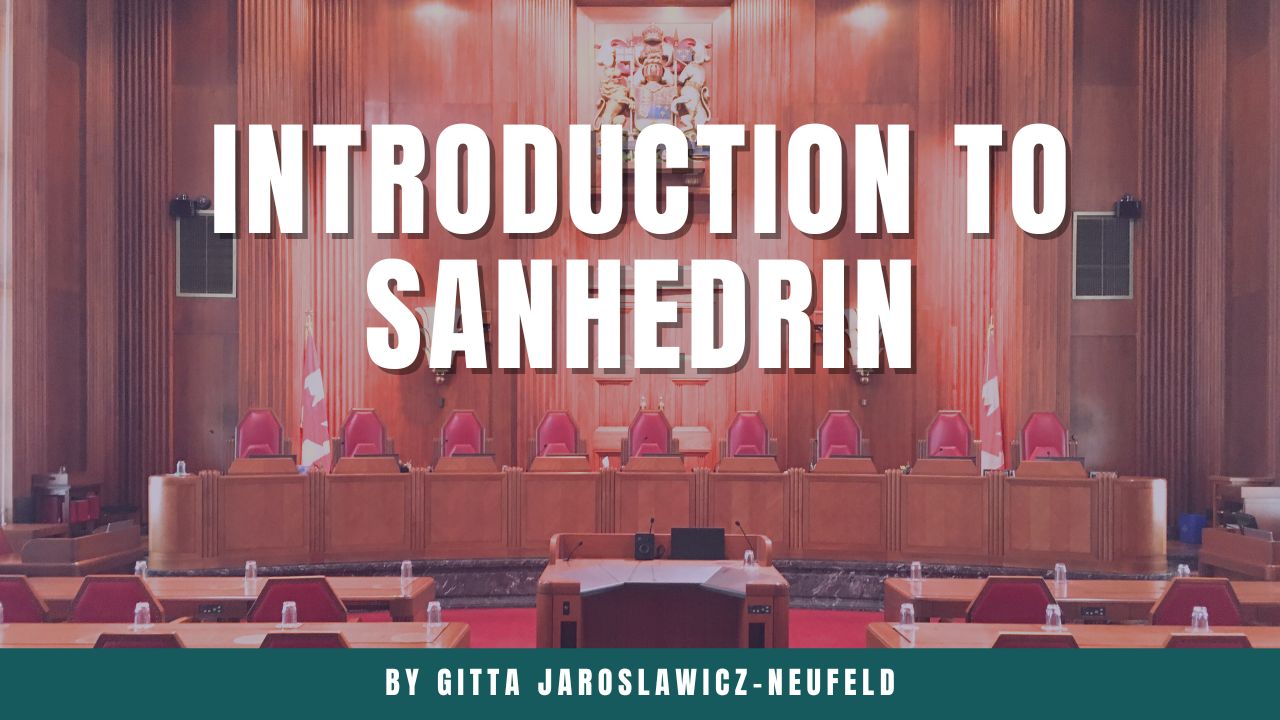If one eats two half olive bulks, what is the time frame in which they will be considered combined in order to obligate? Is it different from one who eats impure foods/drink and is then considered having second degree impurity? The rabbis didn’t allow one who ate less than a shiur (regarding impurity) to go to the mikveh – why? They allowed a pregnant woman to eat less than a shiur out of danger – what is the case and why not more than that? The rabbis allowed a nursing mother with first degree impurity to nurse her child without the child becoming impure – why? What is the status of breastmilk of an impure woman – is it like a flow (more severe impurity) or not? A priest who has drunk can’t come into the temple – what are the details of this prohibition?
This week’s learning is sponsored for the merit and safety of Haymanut (Emuna) Kasau, who was 9 years old when she disappeared from her home in Tzfat two years ago, on the 16th of Adar, 5784 (February 25, 2024), and whose whereabouts remain unknown.
This week’s learning is dedicated of the safety of our nation, the soldiers and citizens of Israel, and for the liberation of the Iranian people. May we soon see the realization of “ליהודים היתה אורה ושמחה וששון ויקר”.
This week’s learning is sponsored for the merit and safety of Haymanut (Emuna) Kasau, who was 9 years old when she disappeared from her home in Tzfat two years ago, on the 16th of Adar, 5784 (February 25, 2024), and whose whereabouts remain unknown.
Want to dedicate learning? Get started here:


Today’s daily daf tools:
This week’s learning is sponsored for the merit and safety of Haymanut (Emuna) Kasau, who was 9 years old when she disappeared from her home in Tzfat two years ago, on the 16th of Adar, 5784 (February 25, 2024), and whose whereabouts remain unknown.
This week’s learning is dedicated of the safety of our nation, the soldiers and citizens of Israel, and for the liberation of the Iranian people. May we soon see the realization of “ליהודים היתה אורה ושמחה וששון ויקר”.
This week’s learning is sponsored for the merit and safety of Haymanut (Emuna) Kasau, who was 9 years old when she disappeared from her home in Tzfat two years ago, on the 16th of Adar, 5784 (February 25, 2024), and whose whereabouts remain unknown.
Today’s daily daf tools:
Delve Deeper
Broaden your understanding of the topics on this daf with classes and podcasts from top women Talmud scholars.
New to Talmud?
Check out our resources designed to help you navigate a page of Talmud – and study at the pace, level and style that fits you.
The Hadran Women’s Tapestry
Meet the diverse women learning Gemara at Hadran and hear their stories.
Keritot 13
אִי אָמְרַתְּ בִּשְׁלָמָא רַבִּי מֵאִיר לְחוּמְרָא, הַיְינוּ דְקָתָנֵי: ״עַד שֶׁיִּשְׁהֶא״, עַד דִּשְׁהִיָּ[ה] דִּילֵיהּ כְּדֵי אֲכִילַת פְּרָס.
Granted, if you say that Rabbi Meir issued his ruling as a stringency, and that one is liable even if he ate the olive-bulk over a long period of time, this is the reason that the tanna teaches that the Rabbis say: Unless the amount of time he expends, meaning: Unless his expenditure of time is no more than the time it takes to eat a half-loaf of bread, he is exempt.
אֶלָּא אִי אָמְרַתְּ רַבִּי מֵאִיר לְקוּלָּא, ״וַחֲכָמִים אוֹמְרִים: אִם שָׁהָה״ מִיבְּעֵי לֵיהּ! אֶלָּא לָאו שְׁמַע מִינָּה: רַבִּי מֵאִיר לְחוּמְרָא? שְׁמַע מִינָּה.
But if you say that Rabbi Meir issued his ruling as a leniency, meaning that if one interrupts in the middle of eating he is exempt, the tanna should have stated: And the Rabbis say: If he expended more than the time it takes to eat a half-loaf, he is exempt, which would indicate that if he expended less than this amount of time he is liable, even if he interrupted his eating in the middle. Rather, isn’t it correct to conclude from it that Rabbi Meir issued his ruling as a stringency? The Gemara affirms: Conclude from it that this is correct.
אָמַר רַבְנַאי אָמַר שְׁמוּאֵל: בַּחֲלָבִים וּבִנְבֵילָה עַד שֶׁיִּשְׁהֶא מִתְּחִלָּה וְעַד סוֹף בִּכְדֵי אֲכִילַת פְּרָס. אוֹכָלִים טְמֵאִים, שְׁקָצִים וּרְמָשִׂים וּמַשְׁקִין – אֲפִילּוּ כׇּל הַיּוֹם כּוּלּוֹ בִּכְדֵי אֲכִילַת פְּרָס.
§ Ravnai says that Shmuel says: With regard to forbidden fats and with regard to an unslaughtered animal carcass, one is liable for eating an olive-bulk even with interruptions unless the time he expends from beginning to end is more than the time it takes to eat a half-loaf of bread, in accordance with the opinion of the Rabbis in the mishna. If he ate impure foods in the volume of a quarter-loaf of bread, or he ate repugnant creatures or creeping animals, or drank a quarter-log of impure liquids, he becomes impure and may not partake of teruma, even if consumption extended for the entire day, provided that they are eaten within the time it takes to eat a half-loaf of bread.
מַאי קָאָמַר? אָמַר רַב פָּפָּא, הָכִי קָאָמַר: אֲפִילּוּ כׇּל הַיּוֹם כּוּלּוֹ, וְהוּא שֶׁאָכַל כְּזַיִת בִּכְדֵי אֲכִילַת פְּרָס.
The Gemara asks: What is Shmuel saying? Rav Pappa said that this is what he is saying: Even if he eats the quarter-loaf of food over the course of the entire day he becomes impure, but that is the halakha only where he ate each olive-bulk within the time it takes to eat a half-loaf of bread.
מֵיתִיבִי: כׇּל הָאוֹכָלִין מִצְטָרְפִין לִפְסוֹל הַגְּוִיָּיה בְּכַחֲצִי פְרָס – מַאי לַָאו דְּאַכְלֵיהּ לַחֲצִי פְרָס בִּכְדֵי אֲכִילַת פְּרָס? לָא, דַּאֲכַל כְּזַיִת כְּזַיִת בִּכְדֵי אֲכִילַת פְּרָס.
The Gemara raises an objection from a baraita: All impure foods combine together to disqualify one’s body from eating teruma if he ate a quarter-loaf of the impure food. What, is this not referring to a case where he ate the quarter-loaf within the time it takes to eat a half-loaf of bread? The Gemara explains: No, it is referring to a case where he ate each olive-bulk within the time it takes to eat a half-loaf of bread, but he ate the full quarter-loaf in longer than that amount of time.
מֵיתִיבִי: כׇּל הָאוֹכָלִין מִצְטָרְפִין לִפְסוֹל אֶת הַגְּוִיָּיה בְּכַחֲצִי פְרָס בִּכְדֵי אֲכִילַת פְּרָס, כֵּיצַד? אָכַל וְחָזַר וְאָכַל, אִם יֵשׁ מִתְּחִלַּת אֲכִילָה רִאשׁוֹנָה וְעַד סוֹף אֲכִילָה אַחֲרוֹנָה כְּדֵי אֲכִילַת פְּרָס – מִצְטָרְפִין, יוֹתֵר מִכָּאן – אֵין מִצְטָרְפִין.
The Gemara raises an objection from another baraita: All impure foods combine to disqualify one’s body from eating teruma if he ate a quarter-loaf of the impure food within the time it takes to eat a half-loaf of bread. How so? In a case where he ate and then ate again, if from the beginning of the first period of eating until the end of the last period of eating there is no more than the amount of time it takes to eat a half-loaf of bread, they combine together. If the time spent eating is more than that, they do not combine together.
לֹא הִתִּירוּ לֶאֱכוֹל פָּחוֹת מִכְּשִׁיעוּר לֵירֵד וְלִטְבּוֹל, יָרַד וְטָבַל וְעָלָה וְהִשְׁלִימוֹ – מִצְטָרֵף. הִתִּירוּ לָהּ לָעוּבָּרָה לֶאֱכוֹל פָּחוֹת מִכְּשִׁיעוּר, מִפְּנֵי הַסַּכָּנָה.
The baraita continues: The Sages did not permit one who ate less than the minimum measure of impure foods, i.e., a quarter-loaf, to descend and to immerse in a ritual bath. If he descended, immersed, ascended, and then ate more impure food and thereby completed consumption of the full measure of a quarter-loaf, this second act combines with his previous consumption of impure food and renders the person unfit to consume teruma, despite the immersion in the interim. The Sages permitted a pregnant woman to eat less than the minimum measure due to the danger of her miscarrying.
כׇּל הַמַּשְׁקִין מִצְטָרְפִין לִפְסוֹל אֶת הַגְּוִיָּיה בִּרְבִיעִית בִּכְדֵי אֲכִילַת פְּרָס. כֵּיצַד? שָׁתָה וְחָזַר וְשָׁתָה, אִם יֵשׁ מִתְּחִלַּת שְׁתִיָּה רִאשׁוֹנָה וְעַד סוֹף שְׁתִיָּה אַחֲרוֹנָה כְּדֵי אֲכִילַת פְּרָס – מִצְטָרְפִין, יוֹתֵר מִכָּאן – אֵין מִצְטָרְפִין.
All impure liquids combine to disqualify one’s body from eating teruma if one consumes a quarter-log within the time it takes to eat a half-loaf of bread.How so? In a case where he drank and then drank again, and in total he drank a quarter-log, if from the beginning of the first act of drinking until the end of the last act of drinking there is no more than the amount of time it takes to eat a half-loaf of bread, they combine together. But if the period of drinking is more than that amount of time, they do not combine.
הִתִּירוּ לָהּ לְמַגַּע טְמֵא מֵת לְהָנִיק בְּנָהּ, וּבְנָהּ טָהוֹר.
With regard to a woman who has the status of first-degree impurity because she came into contact with one who was impure with impurity imparted by a corpse, the Sages permitted her to nurse her child, and her child remains pure. If the child touches teruma he does not render it disqualified, despite having consumed milk that presumably became impure upon leaving the body of the mother. This concludes the baraita.
קָתָנֵי מִיהַת: אִם יֵשׁ מִתְּחִלַּת אֲכִילָה רִאשׁוֹנָה וְעַד סוֹף אֲכִילָה בִּכְדֵי אֲכִילַת פְּרָס – מִצְטָרֵף. תְּיוּבְתָּא דְּרַבְנַאי, תְּיוּבְתָּא.
The Gemara explains its objection from the baraita: In any event, the baraita taught that if from the beginning of the first period of eating until the end of the last period of eating there is no more than the amount of time it takes to eat a half-loaf of bread, they combine together. This apparently contradicts the opinion of Ravnai, who says that if one eats a quarter-loaf of impure food in total and ate each olive-bulk within the time it takes to eat a half-loaf of bread, his acts of eating combine together and he is disqualified from consuming teruma. The Gemara concludes: The refutation of the opinion of Ravnai is a conclusive refutation.
אָמַר מָר: לֹא הִתִּירוּ לוֹ לֶאֱכוֹל פָּחוֹת מִכְּשִׁיעוּר לֵירֵד וְלִטְבּוֹל. מַאי קָאָמַר?
§ The Gemara further discusses the baraita. The Master said above: The Sages did not permit one who ate less than the minimum measure of impure foods, i.e., a quarter-loaf, to descend and to immerse in a ritual bath. The Gemara asks: What is he saying; why is this prohibited?
אָמַר רַב יְהוּדָה, הָכִי קָאָמַר: אָכַל פָּחוֹת מִכְּשִׁיעוּר – לֹא הִתִּירוּ לוֹ לֵירֵד וְלִטְבּוֹל, שֶׁאִם יָרַד וְטָבַל וְעָלָה וְהִשְׁלִימוֹ – מִצְטָרֵף. וְאָתֵי לְמֵימַר: אַהֲנִי לִי טְבִילָה קַמַּיְיתָא, וְאֵין יוֹדֵעַ שֶׁאֵין טְבִילָה אֶלָּא בָּאַחֲרוֹנָה.
Rav Yehuda said that this is what the tanna in the baraita is saying: If he ate less than the minimum measure that causes impurity, the Sages did not permit him to descend and immerse. As, if he would descend and immerse and ascend and eat more impure food and thereby complete the full measure of a quarter-loaf within the time it takes to eat a half-loaf, all the impure food he ate would combine together to disqualify him from eating teruma; and yet he might come to say: My first immersion following my first consumption of impure food was effective for me, and no additional immersion is required now that I ate merely another half-measure of impure food. But in fact, he does not know that immersion is effective in purifying him only at the end, and that if he now makes contact with teruma he will render it disqualified. Therefore, the Sages prohibited immersion in such a case to prevent one from reaching this erroneous conclusion.
קָתָנֵי: הִתִּירוּ לָהּ לָעוּבָּרָה לֶאֱכוֹל פָּחוֹת מִכְּשִׁיעוּר מִפְּנֵי הַסַּכָּנָה. מִפְּנֵי הַסַּכָּנָה אֲפִילּוּ טוּבָא נָמֵי תֵּיכוֹל! אָמַר רַב פָּפָּא, הָכִי קָתָנֵי: הִתִּירוּ לָהּ לָעוּבָּרָה פָּחוֹת מִכְּשִׁיעוּר, אֲפִילּוּ טוּבָא, מִפְּנֵי הַסַּכָּנָה.
The Gemara analyzes another statement from the baraita: It was taught that the Sages permitted a pregnant woman to eat less than the minimum measure due to the danger of her miscarrying. Under the assumption that she is permitted to eat only less than the measure but not a full measure, the Gemara objects: Since it is permitted for her due to the danger, let her even eat a lot, i.e., more than the measure. Rav Pappa said that this is what the baraita is teaching: They permitted a pregnant woman to eat less than the measure of an olive-bulk within the time it takes to eat a half-loaf of bread, even if she ultimately eats a lot in this manner, due to the danger of her miscarrying.
קָתָנֵי: הִתִּירוּ לְמַגַּע טְמֵא מֵת לְהָנִיק אֶת בְּנָהּ, וּבְנָהּ טָהוֹר – אַמַּאי טָהוֹר? כֵּיוָן דִּיינַק חָלָב אִיטַּמִּי לֵיהּ מֵחָלָב!
The Gemara further discusses the baraita: It was taught that with regard to a woman who came in contact with one who was impure due to a corpse, the Sages permitted her to nurse her child, and her child remains pure and may therefore be fed teruma. The Gemara asks: Why is he pure? Once he nurses from the milk of his mother, he becomes impure from the milk.
וְכִי תֵּימָא: לָא אִיתַּכְשַׁר – נִתַּכְשַׁר בְּטִיפָּה מְלוּכְלֶכֶת עַל פִּי הַדַּד! אָמַר רַב נַחְמָן אָמַר רַבָּה בַּר אֲבוּהּ: בִּתְקִיפָה אַחַת, לֹא הִנִּיחַ טִיפָּה מְלוּכְלֶכֶת עַל פִּי הַדַּד.
And if you would say that the mother’s milk was not rendered susceptible to impurity because it never came into contact with a liquid, which is necessary in order to render a food item susceptible to impurity, that is not so, as it is rendered susceptible to ritual impurity due to the drop of milk that is smeared on the nipple. Since this drop is not consumed by the child, it attains the status of a liquid rather than a food, and it subsequently renders the rest of the milk that passes through the nipple susceptible to impurity. Rav Naḥman said that Rabba bar Avuh said: The baraita is referring to a case where the child nursed with one strong suck, and therefore it did not leave a drop of milk smeared on the nipple.
אָמַר רָבָא: שְׁתֵּי תְשׁוּבוֹת בַּדָּבָר: חֲדָא, דְּקָחָזֵינָא לְפוּמֵּיהּ דְּיָנוֹקָא דִּמְלֵא חָלָב! וְעוֹד, מְקוֹם חָלָב מַעְיָין הוּא.
Rava said: There are two refutations of this statement: One is that we see that the mouth of the infant is filled with milk, which means that it is impossible for it to have sucked so powerfully that it immediately swallowed all the milk without leaving a drop on the nipple. And furthermore, the mother’s milk does not need to be rendered susceptible to impurity like other foods in order to become impure and transmit impurity. This is because the location from which the milk emerges is a spring, i.e., it has the same status as the woman’s body. Therefore, if the woman is impure, her milk is also impure.
דְּקָתָנֵי: חֲלֵב אִשָּׁה מְטַמֵּא בֵּין לְרָצוֹן וּבֵין שֶׁלֹּא לְרָצוֹן, (בְּהֵמָה אֵינָהּ מְטַמֵּא אֶלָּא לְרָצוֹן.)
Rava elaborates: As a mishna (Makhshirin 6:8) teaches: A woman’s milk renders food with which it comes into contact susceptible to impurity, whether it emerges to the satisfaction of the infant or not to its satisfaction. By contrast, the milk of an animal renders food susceptible to impurity only if it emerges to the satisfaction of the animal’s owner.
מַאי לַָאו ״שֶׁלֹּא לְרָצוֹן״ – דְּלָא נִיחָא לֵיהּ, וְקָתָנֵי: ״מְטַמֵּא״?
What, is it not correct to say that when the mishna states that the milk emerged not to the satisfaction of the infant, it means that the milk is not amenable to him at that time, and yet the mishna teaches that it renders food susceptible to impurity? Since liquids generally render foods susceptible to impurity only if they come in contact with the food with the owner’s approval, it is clear that a woman’s milk has a different status than other foods or liquids. This means that it need not come into contact with a liquid in order to become impure or to impart impurity to another item. The question therefore remains: Why does the child remain pure when he drinks this impure liquid?
אֶלָּא אָמַר רָבָא: הַיְינוּ טַעְמָא דִּבְנָהּ טָהוֹר – דְּסָפֵק יָנַק כַּשִּׁיעוּר וְסָפֵק לֹא יָנַק, וְאִם תִּמְצָא לוֹמַר יָנַק, סָפֵק יְנָקוֹ בַּאֲכִילַת פְּרָס, סְפֵק יְנָקוֹ בְּיוֹתֵר מִכְּדֵי אֲכִילַת פְּרָס.
Rather, Rava said that this is the reason that her child remains pure: The reason is that it is uncertain whether it nursed the measure of milk necessary to disqualify it from consuming teruma, or whether it did not nurse a sufficient amount of milk. And even if you say that it nursed a sufficient amount of milk, it is still uncertain whether it nursed the required amount of milk within the time it takes to eat a half-loaf of bread, or whether it nursed that amount in more than the time it takes to eat a half-loaf of bread and therefore is not disqualified from consuming teruma.
וּלְרָבָא, מְקוֹם חָלָב מַעְיָין הוּא, וְלֹא צָרִיךְ הֶכְשֵׁר?
The Gemara asks: And according to the opinion of Rava, is it correct that the location from which the milk emerges is considered like a spring, and therefore if the woman is impure the milk is also impure, and it does not need to be rendered susceptible to ritual impurity by contact with a liquid?
וְהָתְנַן: הָאִשָּׁה שֶׁנָּטַף חָלָב מִדַּדֶּיהָ וְנָפַל לַאֲוִיר תַּנּוּר – תַּנּוּר טָמֵא. וְקַשְׁיָא לַן: בְּמַאי אִיתַּכְשַׁר? וְאָמַר רַבִּי יוֹחָנָן: בְּטִיפָּה מְלוּכְלֶכֶת עַל פִּי הַדַּד.
But didn’t we learn in a mishna (Kelim 8:11): In the case of a menstruating woman who had milk dripping from her nipples, and it fell into the airspace of an oven, the oven becomes impure. And this poses a difficulty for us: In what way was the milk rendered susceptible to impurity, such that it can become impure or render the oven impure? And Rabbi Yoḥanan said: It was rendered susceptible by the drop of milk smeared on the nipple. Apparently, Rabbi Yoḥanan maintains that a woman’s milk must be rendered susceptible in order to contract impurity.
וְכִי תֵּימָא, רָבָא לָא סָבַר לַהּ כְּרַבִּי יוֹחָנָן, וְהָתַנְיָא: נִמְצֵאתָ אַתָּה אוֹמֵר, תִּשְׁעָה מַשְׁקִין בְּזוֹב: הַזֵּיעָה, וְלֵיחָה סְרוּחָה, וְרֶיעִי – טְהוֹרִין מִכְּלוּם. דִּמְעַת עֵינוֹ, וְדַם מַגֵּפָתוֹ,
And if you would say that Rava does not hold in accordance with the opinion of Rabbi Yoḥanan, as one amora is permitted to disagree with another, but isn’t it taught in a baraita: You are found saying that there are nine liquids with regard to a zav: The sweat, ill-smelling pus, and liquid excrement are more pure than all of them, i.e., they do not become impure and do not render other items susceptible to impurity. The tears that emerge from his eye, and the blood that emerges from his wound,
וַחֲלֵב אִשָּׁה – מְטַמְּאִין טוּמְאַת מַשְׁקִין בִּרְבִיעִית. רוּקּוֹ, זוֹבוֹ, וּמֵימֵי רַגְלָיו – מְטַמְּאִין טוּמְאָה חֲמוּרָה, בְּכֹל שֶׁהוּא.
and the milk of a woman who is a zava transmit impurity of liquids where there is a quarter-log. The saliva, gonorrhea-like discharge of a zav, and urine transmit severe impurity in any amount.
וְאִי אָמְרַתְּ מְקוֹם חָלָב מְעַיֵּין [הוּא], חָלָב נָמֵי נְטַמֵּא טוּמְאָה חֲמוּרָה בְּכֹל שֶׁהוּא, כְּזוֹבוֹ וְרוּקּוֹ! אֶלָּא שְׁמַע מִינַּהּ: מְקוֹם חֲלֵב אִשָּׁה לָאו מַעְיָין הוּא.
And if you say in accordance with the opinion of Rava that the location from which the milk emerges is considered a spring, then milk also should transmit severe impurity in any amount, like the gonorrhea-like discharge of a zav and his saliva. Rather, conclude from it that the location from which the milk of a woman emerges is not considered to be a spring, and the milk must be rendered susceptible to impurity in order to become impure or transmit impurity.
אִי הָכִי, קַשְׁיָא הָא מַתְנִיתָא וְאָמַר רָבָא: ״מְטַמֵּא בֵּין לְרָצוֹן וּבֵין שֶׁלֹּא לְרָצוֹן״!
The Gemara objects: If so, this mishna in Makhshirin cited earlier (13a), which Rava said supports his opinion, is difficult, as it states that a woman’s milk renders food susceptible to impurity whether it emerged to the satisfaction of the infant or not to his satisfaction. The mishna is difficult, as food is generally rendered susceptible to impurity only when the liquid comes into contact with it to the owner’s satisfaction.
מִי סָבְרַתְּ ״שֶׁלֹּא לְרָצוֹן״ דְּאָמַר – דְּלָא נִיחָא לֵיהּ? לָא, מַאי ״שֶׁלֹּא לְרָצוֹן״ דְּאָמַר, דְּדַעְתֵּיהּ דְּתִינוֹק קָרִיבָא לְגַבֵּי חָלָב, אֲבָל אָמַר לָא נִיחָא לֵיהּ – טָהוֹר.
The Gemara explains: Do you maintain that the term: Not to their satisfaction, that the mishna states, means that the emergence of the milk is not amenable to him? No; rather, what is the meaning of the expression: Not to his satisfaction, that the mishna states? It means that the child did not indicate whether he desires the milk or not, but as a child’s mind is close to milk, i.e., he generally enjoys the milk, an explicit indication of interest or satisfaction is unnecessary in order for the milk to be susceptible to ritual impurity or to render other food items impure. But if he says, i.e., indicates, explictly that the milk is not amenable to him, then the milk is not susceptible to ritual impurity, and it remains pure.
אָכַל אוֹכָלִין טְמֵאִין וְכוּ׳. לְמָה לִי שְׁהִיָּיה, דְּקָתָנֵי: וְשָׁהָה? אָמַר רַב יְהוּדָה, הָכִי קָתָנֵי: אָכַל אוֹכָלִין טְמֵאִין, וְשָׁתָה מַשְׁקִין טְמֵאִין, וְשָׁתָה רְבִיעִית יַיִן, וְשָׁהָה בַּאֲכִילָתָן וּבִשְׁתִיָּיתָן כְּדֵי אֲכִילַת פְּרָס, וְנִכְנַס לַמִּקְדָּשׁ – חַיָּיב.
The mishna teaches that if one ate one quarter-loaf of ritually impure foods or drank a quarter-log of ritually impure liquids, or if one drank a quarter-log of wine, and he entered the Temple and remained there for the time it takes to eat a half-loaf of bread, he is liable. The Gemara objects: Why do I need him to remain in the Temple in order to be liable, such that it teaches: And remained there? Rav Yehuda said that this is what the mishna is teaching: In the case of one who ate a quarter-loaf of ritually impure foods or drank a quarter-log of impure liquids, or drank a quarter-log of wine, and remained involved in eating them or drinking them for no more than the time it takes to eat a half-loaf of bread, and then entered the Temple, he is liable.
רַבִּי אֶלְעָזָר אוֹמֵר כּוּ׳. תָּנוּ רַבָּנַן: ״יַיִן וְשֵׁכָר אַל תֵּשְׁתְּ״ – יָכוֹל אֲפִילּוּ כֹּל שֶׁהוּא, אֲפִילּוּ מִגִּתּוֹ?
§ The mishna teaches that Rabbi Elazar says: If one interrupted his drinking of the quarter-log of wine, or if he placed any amount of water into the wine, he is exempt. The Sages taught in a baraita: When the Torah instructs Aaron the High Priest: “Drink no wine nor intoxicating drink, you, nor your sons with you, when you go into the Tent of Meeting, that you shall not die” (Leviticus 10:9), one might have thought that this applies even if he drank any amount, and even if he drank wine from its press, i.e., wine that has not finished fermenting.
תַּלְמוּד לוֹמַר: ״וְשֵׁכָר״ – אֵין אָסוּר אֶלָּא כְּדֵי לְשַׁכֵּר, וְכַמָּה כְּדֵי לְשַׁכֵּר? רְבִיעִית יַיִן בֶּן אַרְבָּעִים יוֹם.
Therefore, the verse states: “Nor intoxicating drink,” indicating that only the consumption of a quantity of wine sufficient to intoxicate is prohibited. And how much wine is sufficient to intoxicate? It is a minimum of a quarter-log of wine that is forty days old, which has already fermented.
אִם כֵּן, מָה תַּלְמוּד לוֹמַר ״יַיִן״? לוֹמַר לְךָ שֶׁמּוּזְהָרִין עָלָיו כֹּל שֶׁהוּא, וּמוּזְהָרִין עָלָיו מִגִּתּוֹ.
If so, why must the verse state “wine,” when the term “intoxicating drink” would have sufficed? It is to tell you that although one is not liable to receive death at the hand of Heaven for it, it is prohibited to drink any amount of it, even less than a quarter-log, and then enter the Temple; and similarly, it is prohibited to drink it from its press and then enter the Temple, and one who does so is liable to be flogged, as is the case with any other prohibition by Torah law.
רַבִּי יְהוּדָה אוֹמֵר: ״יַיִן״ – אֵין לִי אֶלָּא יַיִן, שְׁאָר מְשַׁכְּרִין מִנַּיִן? תַּלְמוּד לוֹמַר: ״וְשֵׁכָר״. אִם כֵּן, מָה תַּלְמוּד לוֹמַר: ״יַיִן״? עַל הַיַּיִן – בְּמִיתָה, וְעַל שְׁאָר מַשְׁקִין – בְּאַזְהָרָה.
Rabbi Yehuda says: From the word “wine” I have derived only that wine is forbidden; from where is it derived that other intoxicating beverages are forbidden as well? The verse states: “Nor intoxicating drink.” If so, why must the verse state “wine”? This comes to teach that for entering the Temple after drinking wine one is liable to receive the punishment of death at the hand of Heaven, but for entering after drinking other intoxicating drinks, one violates only a regular prohibition.
רַבִּי אֶלְעָזָר אוֹמֵר: ״יַיִן אַל תֵּשְׁתְּ וְשֵׁכָר״ – אַל תִּשְׁתֵּהוּ כְּדֶרֶךְ שִׁכְרוּתוֹ, הָא אִם הִפְסִיק בּוֹ, אוֹ נָתַן לְתוֹכוֹ מַיִם כֹּל שֶׁהוּא – פָּטוּר.
Rabbi Elazar says that the verse is interpreted to mean: Wine you shall not drink, and intoxicating drink, meaning that you shall not drink it in the manner of its being intoxicating. But if one interrupted his drinking, or placed any amount of water into it and drank it, he is exempt.
בְּמַאי פְלִיגִי? תַּנָּא קַמָּא סָבַר: גָּמְרִינַן ״שֵׁכָר״ ״שֵׁכָר״ מִנָּזִיר.
The Gemara explains: With regard to what do they disagree? The first tanna holds: We learn by verbal analogy that the term “intoxicating drink” is referring to wine, from the term “intoxicating drink” mentioned with regard to a nazirite in the verse: “He shall abstain from wine and intoxicating drink” (Numbers 6:3). There it is referring only to wine (see Nazir 4a).
וְרַבִּי יְהוּדָה לָא יָלֵיף ״שֵׁכָר״ ״שֵׁכָר״ מִנָּזִיר. וְרַבִּי אֶלְעָזָר סָבַר: מַאי ״שֵׁכָר״? מִידֵּי דְּהוּא מְשַׁכֵּר.
But Rabbi Yehuda does not derive that the term “intoxicating drink” refers only to wine by the verbal analogy from the term “intoxicating drink” stated with regard to a nazirite. Consequently, he interprets the word as referring to an intoxicating drink that is not wine. And Rabbi Elazar holds: What is the meaning of the phrase: “Wine and intoxicating drink”? It is not referring to two separate items, but rather to wine in the manner that it intoxicates.
כְּמַאן אָזְלָא הָא דְּתַנְיָא: אָכַל דְּבֵילָה קְעִילִית, וְשָׁתָה דְּבַשׁ אוֹ חָלָב, וְנִכְנַס לַמִּקְדָּשׁ וְשִׁימֵּשׁ – לוֹקֶה, כְּמַאן? כְּרַבִּי יְהוּדָה. אָמַר רַב יְהוּדָה בַּר אֲחוֹתַאי: הֲלָכָה כְּרַבִּי אֶלְעָזָר. וְקָרֵי רַב עֲלֵיהּ דְּרַבִּי אֶלְעָזָר: ״טוּבְיָנָא דְּחַכִּימֵי״.
The Gemara comments: In accordance with whose opinion is that which is taught in the following baraita: In the case of one who ate a sweet dried fig from Ke’ila, or drank honey or milk, all of which can have an intoxicating effect, and he entered the Temple and performed the Temple service, he is flogged. In accordance with whose opinion is this? It is in accordance with the opinion of Rabbi Yehuda, who maintains that any item which intoxicates is included in the prohibition. Rav Yehuda bar Aḥotai says: The halakha is in accordance with the opinion of Rabbi Elazar, and Rav referred to Rabbi Elazar as the most gratified of the Sages, as the halakha is in accordance with his opinion.
רַב אַחָא דְּהוּצָל הֲוָה נִידְרָא עֲלַהּ דְּבֵיתְהוּ, אֲתָא לְקַמֵּיהּ דְּרַב אָשֵׁי, אֲמַר לֵיהּ: זִיל הָאִידָּנָא וְתָא לִמְחַר, דְּרַב לָא מוֹקֵי אָמוֹרָא עֲלֵיהּ מִיּוֹמָא טָבָא לְחַבְרֵיהּ מִשּׁוּם שִׁכְרוּת.
The Gemara relates that Rav Aḥa of the city of Huzal had taken a vow not to derive benefit from his wife. He came before Rav Ashi to request that he dissolve the vow. Rav Ashi said to him: Go now and come back tomorrow, as I have just drunk wine, and it is prohibited for me to issue a halakhic ruling, as Rav would not place a disseminator before him to communicate his lectures to the masses from the meal of one Festival day until the other, i.e., the next morning, due to drunkenness. Since it was customary to drink wine during Festival meals, Rav would not deliver public lectures on Festival days, as one who has consumed wine may not issue halakhic rulings.
אֲמַר לֵיהּ, וְהָאָמַר רַב: הֲלָכָה כְּרַבִּי אֶלְעָזָר, וּמָר הוּא דְּקָא רָמֵי בֵּיהּ מַיָּא! אֲמַר לֵיהּ, הָא לָא קַשְׁיָא: הָא בִּרְבִיעִית, הָא בְּיוֹתֵר מִכְּדֵי רְבִיעִית.
Rav Aḥa said to him: But doesn’t Rav say: The halakha is in accordance with the opinion of Rabbi Elazar that if one diluted the wine he drank with water and entered the Temple he is exempt; and the Master is one who puts water into his wine? Rav Ashi said to him: That is not difficult; that ruling of Rabbi Elazar applies in a case where one drank precisely a quarter–log of wine, whereas in this case I drank more than a quarter–log of wine. In such a case one does not maintain a clear mind even if he mixed in a small amount of water.
תָּנוּ רַבָּנַן: ״וּלְהַבְדִּיל בֵּין הַקֹּדֶשׁ וּבֵין הַחוֹל״ – אֵלּוּ דָּמִין וַעֲרָכִין, חֲרָמִין וְהֶקְדֵּשׁוֹת.
§ In the continuation of the passage in which the Torah prohibits a priest from entering the Temple after drinking wine, the verse states: “And that you may differentiate between the sacred and the common, and between the impure and the pure; and that you may instruct the children of Israel in all the statutes which the Lord has spoken to them by the hand of Moses” (Leviticus 10:10–11). The Sages taught in a baraita: The verse states: “And that you may differentiate between the sacred and the common.” These terms are referring to the halakhot of values and valuations, dedications and consecrations, and the verse is teaching that it is prohibited to issue a ruling concerning these matters after drinking wine.
״בֵּין הַטָּמֵא וּבֵין הַטָּהוֹר״ – אֵלּוּ טְמָאוֹת וּטְהָרוֹת. ״וּלְהוֹרוֹת״ – זוֹ הוֹרָאָה. ״אֵת כׇּל הַחוּקִּים״ – אֵלּוּ מִדְרָשׁוֹת. ״אֲשֶׁר דְּבַר ה׳״ – זוֹ הֲלָכָה. ״בְּיַד מֹשֶׁה״ – זֶה תַּלְמוּד.
“Between the impure and the pure”; these terms indicate that it is prohibited for one who drank wine to render decisions with regard to ritually impure items and ritually pure items. “And that you may instruct”; this is referring to issuing a ruling about what is permitted or prohibited. “All the statutes”; this is referring to the halakhic expositions of the Torah. “Which the Lord has spoken”; this is referring to halakha transmitted orally to Moses from Sinai. “By the hand of Moses”; this is referring to the Talmud, the deliberations on the Oral Law, from which halakhic conclusions are derived. It is prohibited to teach any of these subjects after drinking wine.
יָכוֹל אַף הַמִּשְׁנָה? תַּלְמוּד לוֹמַר: ״וּלְהוֹרוֹת״. רַבִּי יוֹסֵי בְּרַבִּי יְהוּדָה אוֹמֵר: יָכוֹל אַף תַּלְמוּד? תַּלְמוּד לוֹמַר: ״וּלְהוֹרוֹת״.
One might have thought that it is prohibited to teach even Mishna after drinking wine. Therefore, the verse states: “And that you may instruct,” indicating that the prohibition is limited to material that provides practical halakhic instruction, whereas one does not derive practical rulings from the Mishna. Rabbi Yosei, son of Rabbi Yehuda, says: One might have thought that even teaching Talmud is prohibited. Therefore, the verse states: “And that you may instruct,” indicating that the prohibition is limited to issuing halakhic rulings, but it does not include teaching material such as Talmud, although halakhic conclusions may be derived from it.
כְּמַאן אָזְלָא הָא דְּתַנְיָא: יָצָא שֶׁרֶץ טָמֵא, וּצְפַרְדֵּעַ טָהוֹר, שֶׁשְּׁתוּיֵי יַיִן מוֹרִין בָּהֶן הוֹרָאָה. נֵימָא רַבִּי יוֹסֵי בְּרַבִּי יְהוּדָה הִיא, וְלָא רַבָּנַן? – אֲפִילּוּ תֵּימָא רַבָּנַן, וְשָׁאנֵי הָכָא, דְּזִיל קְרִי בֵּי רַב הוּא.
The Gemara asks: In accordance with whose opinion is that which is taught in a baraita: The rulings that a carcass of a creeping animal is ritually impure and that a carcass of a frog is pure are excluded from this principle, as those who have drunk wine may issue a halakhic ruling about these matters. Let us say that this is in accordance with the opinion of Rabbi Yosei, son of Rabbi Yehuda, who says it is permitted to teach Talmud, and these conclusions are obvious from the Talmud, and that it is not in accordance with the opinion of the Rabbis. The Gemara responds: You may even say that it is in accordance with the opinion of the Rabbis, and that this case is different, as it is a topic that one could go learn in a children’s school, and teaching is not considered issuing a halakhic ruling.
אָמַר רַב: הֲלָכָה כְּרַבִּי יוֹסֵי בְּרַבִּי יְהוּדָה. וְהָא רַב לָא מוֹקֵים אָמוֹרָא מִיּוֹמָא טָבָא לְחַבְרֵיהּ מִשּׁוּם שִׁכְרוּת! שָׁאנֵי רַב, דְּאוֹרִי מוֹרֵי. וְנֹיקֵם (דְּלָא) [וְלָא] לוֹרֵי! – כֹּל הֵיכָא דְּיָתֵיב רַב לָא סַגִּי לֵיהּ בְּלָא הוֹרָאָה.
Rav says: The halakha is in accordance with the opinion of Rabbi Yosei, son of Rabbi Yehuda, that it is permitted to teach material from which halakha may be derived, but it is prohibited to issue halakhic rulings. The Gemara objects: But Rav himself would not place a disseminator before him to communicate his lectures to the masses from the meal of one Festival day until the other, i.e., the next morning, due to drunkenness. The Gemara explains: Rav is different, as he would issue halakhic rulings during his lectures. The Gemara further objects: And let him place a disseminator and deliver a lecture but not issue halakhic rulings. The Gemara explains: Wherever Rav sits and delivers a lecture, it is not possible for him to do so without issuing a halakhic ruling.
מַתְנִי׳ יֵשׁ אוֹכֵל אֲכִילָה אַחַת וְחַיָּיבִין עָלֶיהָ אַרְבָּעָה חַטָּאוֹת וְאָשָׁם אֶחָד: טָמֵא שֶׁאָכַל חֵלֶב, וְהָיָה נוֹתָר מִן הַמּוּקְדָּשִׁין, בְּיוֹם הַכִּפּוּרִים.
MISHNA: There is a case where one can perform a single act of eating an olive-bulk of food and be liable to bring four sin offerings and one guilt offering for it. How so? This halakha applies to one who is ritually impure who ate forbidden fat, and it was left over from a consecrated offering after the time allotted for its consumption [notar], on Yom Kippur. He is liable to bring sin offerings for eating forbidden fat and notar, for eating the meat of an offering while impure, and for eating on Yom Kippur. He is also liable to bring a guilt offering for misuse of consecrated property.
רַבִּי מֵאִיר אוֹמֵר: אִם הָיָה שַׁבָּת וְהוֹצִיאוֹ – חַיָּיב. אָמְרוּ לוֹ: אֵינוֹ מִן הַשֵּׁם.
Rabbi Meir says: If it was Shabbat and he carried it out from a private domain to a public domain while eating it, he would be liable to bring an additional sin offering for performing prohibited labor on Shabbat. The Rabbis said to him: That liability is not from the same type of prohibition, as it is not due to the act of eating, and therefore, it should not be counted.


